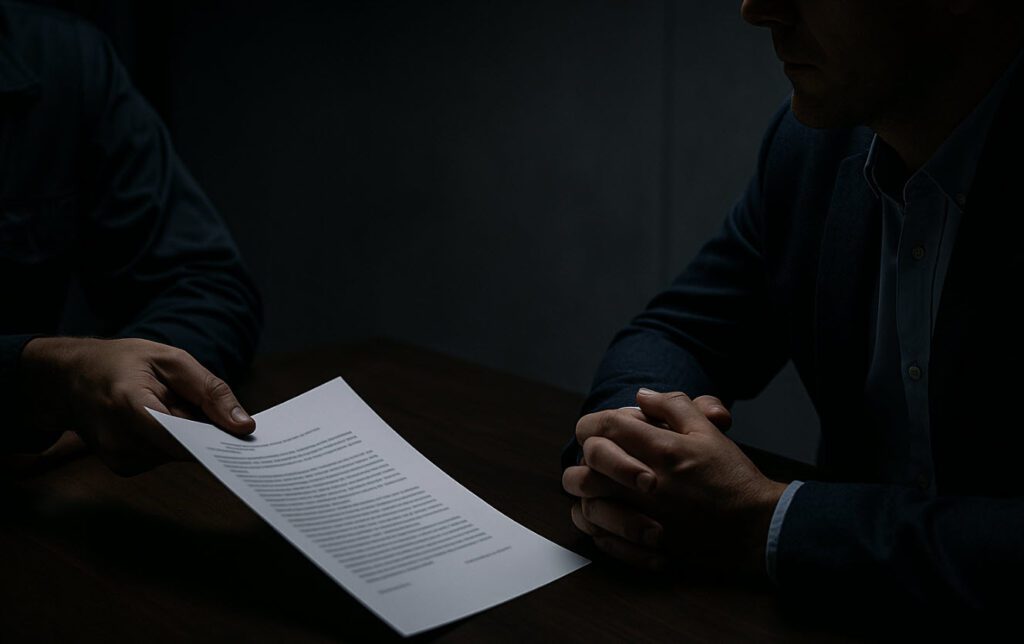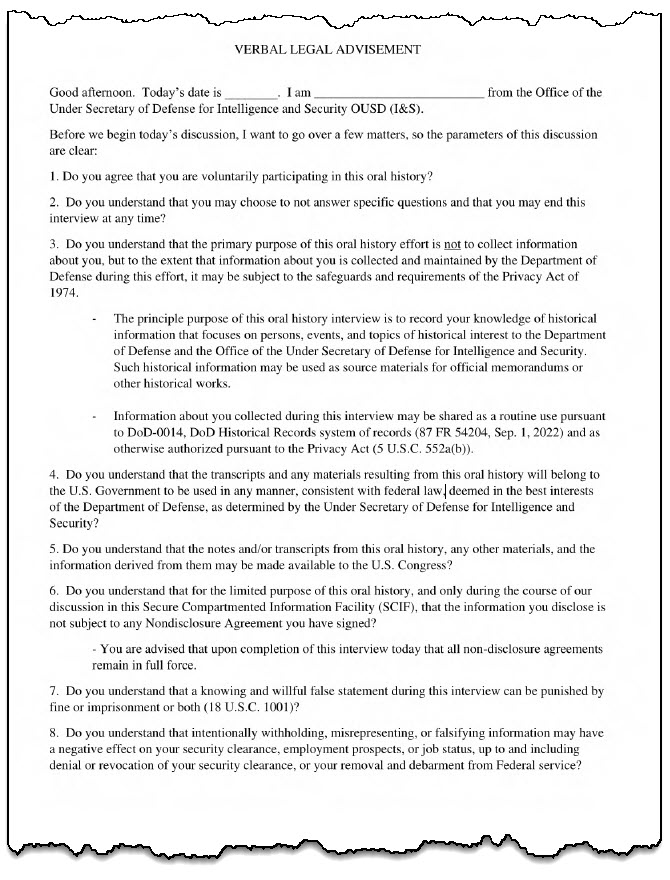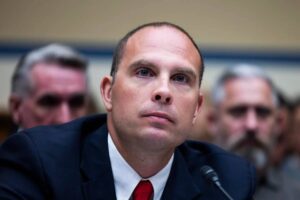
The Department of Defense (DOD) has released, in full, the exact text of the “Verbal Legal Advisement” presented to UFO whistleblower David Grusch and likely other witnesses during All-domain Anomaly Resolution Office (AARO) interviews. The release, under FOIA case 24-F-1138 filed by The Black Vault in April 2024, answers questions raised in previous disclosures and sheds new light on how AARO sought to address concerns about security, legal liability, and nondisclosure agreements (NDAs) for witnesses providing classified UAP-related testimony.
In 2023 and 2024, AARO made numerous documented attempts to interview David Grusch regarding his claims of government involvement with and knowledge about extraterrestrial materials and reverse engineering programs. As detailed in prior FOIA releases (24-F-0266), Grusch repeatedly raised questions about whether AARO was legally authorized to receive highly classified information, including materials covered by NDAs and Special Access Programs (SAPs).
AARO staff responded by providing memorandums from both the Department of Defense and the Office of the Director of National Intelligence, explicitly affirming AARO’s legal authority to receive all levels of UAP-related information “notwithstanding any nondisclosure agreement you may have signed”.
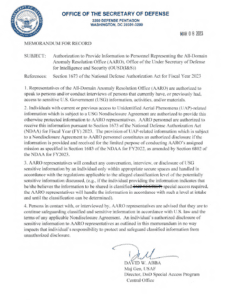
Despite this, Grusch continued to seek written and verbal assurances and requested further documentation about policies and procedures for handling such information, specifically questioning the limits of AARO’s authority and the protections for those disclosing sensitive material.
FOIA case 24-F-1138, filed in April 2024 by The Black Vault, specifically sought the wording of the “Verbal Legal Advisement” referenced in previous correspondence with Grusch. The DOD’s full release now makes this critical document available to the public for the first time.
The advisement, read aloud to witnesses prior to interviews, sets forth the following key points:
-
Voluntary Participation: Witnesses are asked to confirm their participation is voluntary and that they may end the interview or decline to answer questions at any time.
-
Privacy Act and Ownership: The interview is conducted primarily to collect historical information, with the understanding that transcripts and materials belong to the U.S. Government, may be shared with Congress, and are subject to the Privacy Act.
-
Legal Status of Disclosures: Critically, the advisement states:
“Do you understand that for the limited purpose of this oral history, and only during the course of our discussion in this Secure Compartmented Information Facility (SCIF), that the information you disclose is not subject to any Nondisclosure Agreement you have signed?”
Witnesses are then advised:
“Upon completion of this interview today all non-disclosure agreements remain in full force.” -
Potential Consequences for False Statements: The advisement also warns witnesses that knowingly providing false information can result in criminal penalties under 18 U.S.C. § 1001 and that withholding or falsifying information may negatively affect their security clearance and federal employment.
The entire “verbal legal advisement” is below:
The advisement is grounded in explicit statutory language. Section 1673 of the FY23 National Defense Authorization Act (NDAA) provides that AARO is “authorized to receive any information related to UAP regardless of classification, and notwithstanding any nondisclosure agreement you may have signed.” This statutory authority is reaffirmed in memorandums from both the DOD Special Access Program Central Office and the Office of the Director of National Intelligence, released to Grusch and now public through FOIA:
-
“Individuals with current or previous access to Unidentified Aerial Phenomena (UAP)-related information which is subject to a USG Nondisclosure Agreement are authorized to provide this otherwise protected information to AARO representatives.”
-
“The provision of UAP-related information which is subject to a Nondisclosure Agreement to AARO personnel constitutes an authorized disclosure if the information is provided and received for the limited purpose of conducting AARO’s assigned mission…”
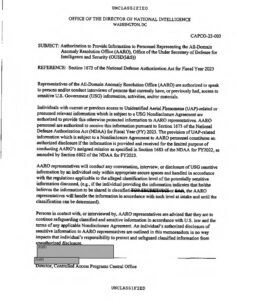
Despite these written and verbal assurances, Grusch continued to seek additional documentation, expressing concern that simply citing the law and a DOD memo might not be sufficient protection, particularly given the complex patchwork of security policies and compartmented access involved. In emails, Grusch pressed for further clarification and asked for memos from additional agencies, including the CIA and Department of Energy, to address SAPs and other access restrictions.
AARO’s position, as reflected in both the advisement and supporting memoranda, is that the law provides broad statutory protection for such disclosures, so long as they occur within the scope of an official AARO interview and in an appropriate secure environment (like a SCIF). The advisement makes clear that any protections are limited to the duration and context of the interview itself. After the interview, all NDAs resume full effect.
As indicated by the released official documents and legal advisement, witnesses disclosing information to AARO in accordance with the advisement and in a secure setting are protected by federal law from NDA enforcement for those specific disclosures. Section 1673 of the FY23 NDAA is explicit, and violation of this provision by DOD officials, such as pursuing retaliation or NDA enforcement for authorized disclosures, would be a violation of federal law. Federal employees who act in bad faith or retaliate against whistleblowers may be subject to administrative or legal sanctions, though specific criminal penalties would depend on the circumstances and intent.
Could the DoD be lying to Grusch in order to pursue legal action after his disclosures during the interview? That is highly unlikely, as knowingly misrepresenting the legal status of NDAs or misleading witnesses about their protections could result in administrative or even criminal consequences under 18 U.S.C. § 1001 (false statements), or for violation of whistleblower protection laws.
The release of the “Verbal Legal Advisement” resolves a longstanding question about what witnesses like David Grusch were told before being asked to testify to AARO. The advisement confirms that, at least for the duration of the official interview, NDAs do not bar disclosure of UAP-related information to AARO. The law provides specific statutory protection for such disclosures, and the DOD has now placed these assurances on the public record.
But, what if the interview needed to extend beyond UAP-related information?
“The key issue here is that many of these activities have conventional classified and compartmented Security Classification Guides that also cover non-UAP activities as well,” Grusch said in a November 13th, 2023, email to the staff of AARO. “To discuss the UAP-related activities would also expose these conventional SAP mission areas. An oral history interview subject must also be absolved of this obligation to protect this information as well, some of it may be bigoted or WAIVED (lAW DODI 5205.11 and 10 USC Sec 119).” This was a concern and issue that Grusch never felt was properly addressed, hence why he did not show for a schedule meeting with them that was originally set that next day on November 14th.
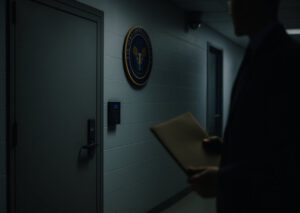 The statutory protections granted by the DoD and the AARO apply specifically to “UAP-related information,” as defined by Section 1673 of the FY23 National Defense Authorization Act (NDAA). The Verbal Legal Advisement and supporting policy memoranda make clear that witnesses can disclose any information directly related to unidentified anomalous phenomena (UAP) during official interviews, and that such disclosures are not subject to any nondisclosure agreements for the duration of the interview. Both DOD and ODNI memoranda affirm that these protections apply when disclosures are made in a secure setting and in the context of AARO’s authorized mission.
The statutory protections granted by the DoD and the AARO apply specifically to “UAP-related information,” as defined by Section 1673 of the FY23 National Defense Authorization Act (NDAA). The Verbal Legal Advisement and supporting policy memoranda make clear that witnesses can disclose any information directly related to unidentified anomalous phenomena (UAP) during official interviews, and that such disclosures are not subject to any nondisclosure agreements for the duration of the interview. Both DOD and ODNI memoranda affirm that these protections apply when disclosures are made in a secure setting and in the context of AARO’s authorized mission.
While these protections do not explicitly extend to information that lies outside the defined bounds of UAP-related topics, the legal advisement provided to witnesses specifically states that participation is voluntary, witnesses may choose not to answer any question, and the interview can be ended at any time. This means that even if there are classified or compartmented matters unrelated to UAPs that a witness feels cannot be shared, all UAP-related information can be disclosed without violating NDAs. If questioning were to extend into areas outside the UAP mandate, the advisement already protects the witness’s right to withhold responses and to withdraw from the interview if necessary.
Given these protections, witnesses are fully authorized to provide testimony and be interviewed on all UAP-related information, without fear of breaching nondisclosure agreements. Any information outside the statutory definition could be omitted, but the law and the DOD’s own procedures make clear that witnesses like Grusch could have participated, disclosed all UAP-related knowledge, and simply declined to answer or end the interview if questions moved beyond those bounds. There is no ambiguity about the legal cover provided for UAP-related disclosures within the formal process.
###
Note: This article focuses on the 2023 correspondence and scheduled meeting between David Grusch and AARO. According to reporting by Matt Laslo on July 18, 2025, Representative Eric Burlison stated that “[David Grusch] and I met with AARO. And separately he and AARO had a long conversation.” However, the specific context, content, and details of those meetings have not been independently confirmed. The Black Vault has submitted additional FOIA requests seeking further information.
Document Archive
 OSD/JS FOIA Case 24-F-1138 [3 pages, 0.8MB]
OSD/JS FOIA Case 24-F-1138 [3 pages, 0.8MB]
 Loading...
Loading...Follow The Black Vault on Social Media:

